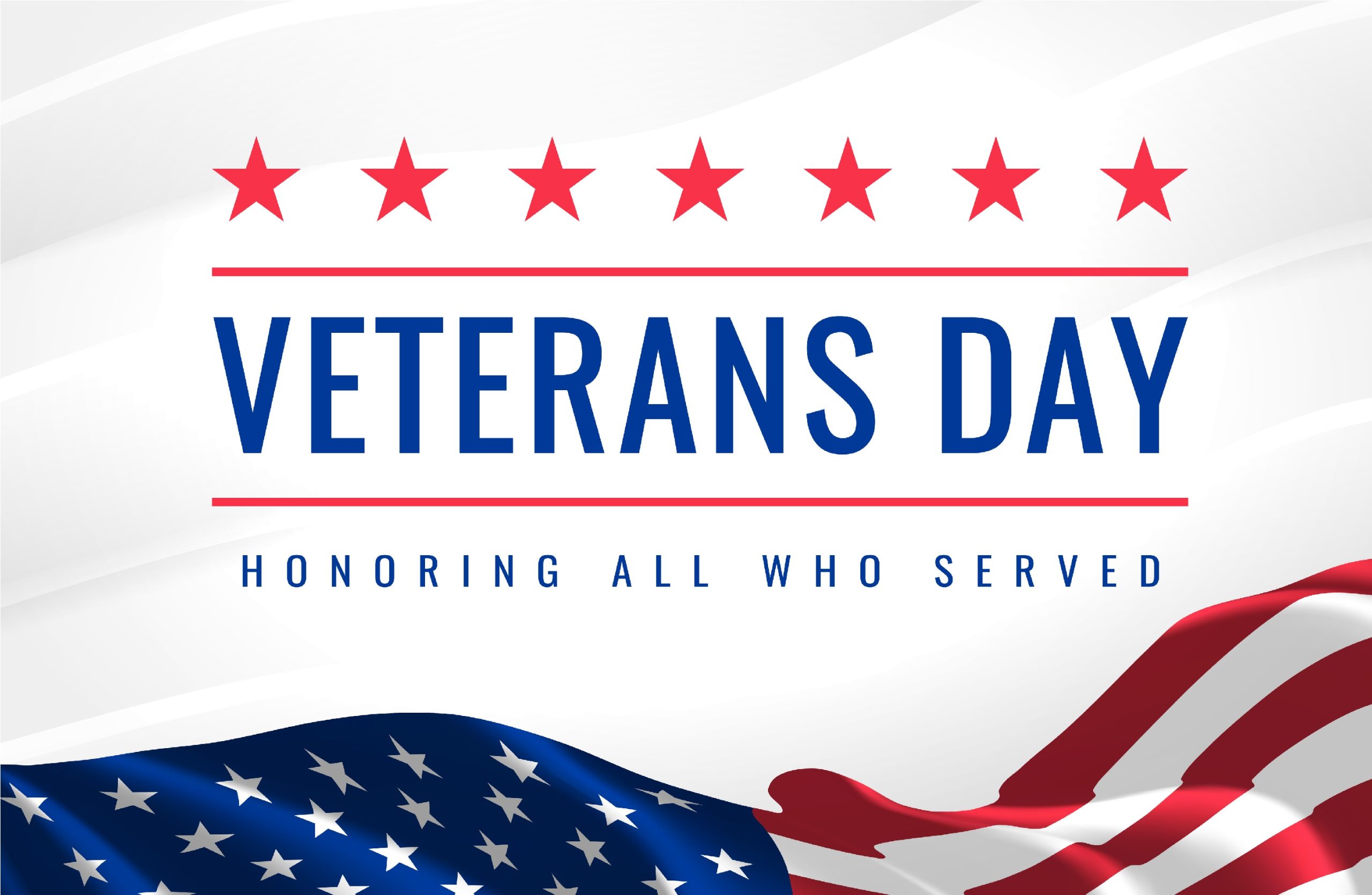Many private and government programs are designed to help disabled veterans socially, mentally, physically, and financially. The tragedy is that many Texas veterans don’t receive the benefits they’re entitled to because they simply don’t know about them or how to apply.
If you are a Texas resident who has provided military service to your country, it’s important to learn how to claim the disability benefits you should receive on a legal, medical, and ethical basis. Here is your comprehensive guide to Texas veterans benefits, how you can qualify for them, and how you can use them to improve the trajectory of your life.
What Should I Know as a Veteran Living in Texas?
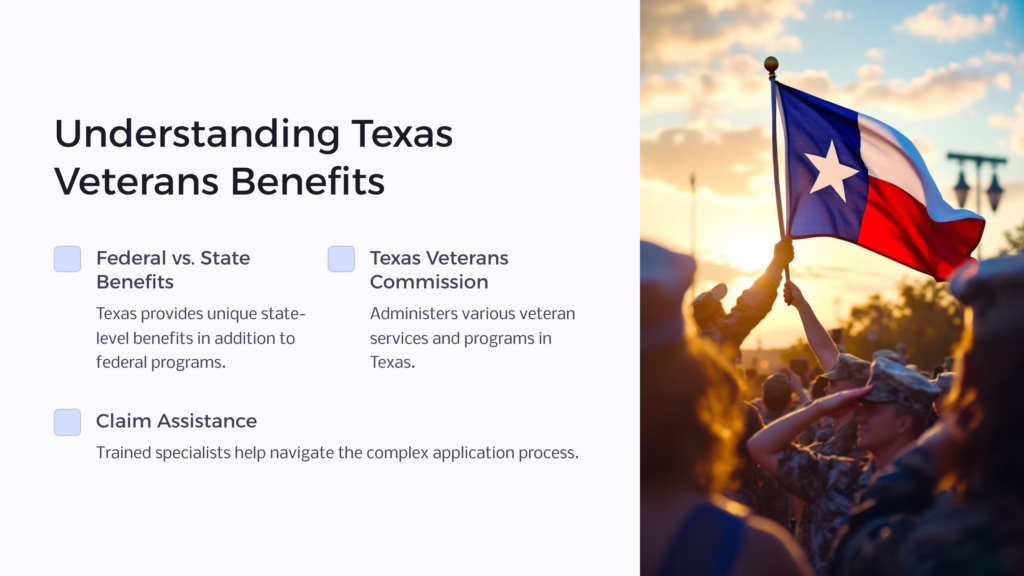
Many disabled veterans know they can receive federal government benefits for their service. But not all are aware of the veteran services offered in their state. Since federal veterans’ benefits are standard across the board, they’re generally easier to understand. On the other hand, individual state veterans’ benefits can vary significantly from state to state. This can make it challenging for those who have provided military service to know what benefits they qualify for in their state.
As a veteran living in Texas, you should know that your state likely provides veterans benefits different from the federal government. Some states may offer some or all of the following benefits to veterans:
- Support groups
- Special discounts on products and services
- VA educational benefits
- Local VA facilities
- Assisted living
- Discounted health care
- Financial aid
- Housing and loan assistance
- Medals and records
- Employment
Some states are known for treating their veterans poorly, but Texas is not one of them. If you know what veterans’ service benefits you’re entitled to and how to get them, you can improve your quality of life in The Lone Star State.
To find out the federal veterans benefits available to you, visit the United States Veterans Affairs website. The Veteran Affairs website contains vast information on the federal government’s veteran programs and services. You can also apply for vocational rehabilitation services, VA health care, pension payments, or make a public information request to receive your military records through the U.S. Department of Veterans Affairs.
Is Texas a Good State for Disabled Veterans?
Texas is a good place to land when you’re a veteran who has served active duty for the United States. Texas is one of the top three most veteran-friendly states in the entire U.S. and offers exceptional military service benefits to veterans and their families. It is home to more than 1.6 million veterans and is the second largest state in the United States. The Texas Veterans Commission administers many different veteran services and programs to Texas veterans.
The problem is that not every service member is currently claiming the Texas benefits to which he or she is entitled! There are so many different organizations, programs, and resources touting to help each Texas veteran. Learning about all of these organizations can be confusing as a veteran. But don’t throw your hands up and forfeit your benefits because it’s too hard to figure out the process of applying for and receiving them! Many veterans find that it helps to work with an organization that knows how to aid them in finding programs for which they qualify.
The Texas Veterans Commission employs trained claims specialists. These specialists can help you understand the benefits you can receive whether you served in the Air Force, Texas National Guard, Texas Homeland Security, or any other armed force. The best part is that these claims specialists are veterans themselves and have a unique understanding of your situation. Their primary goal is to help you navigate the notoriously complicated process of applying for veterans’ benefits.
What Benefits Do Disabled Veterans Get in Texas?
Texas offers some of the best benefits for Texas veterans. Here are some of the VA benefits you may qualify for if you are on active duty or have previously provided military service. Some of the state benefits veterans may be eligible to receive include:
Education Benefits
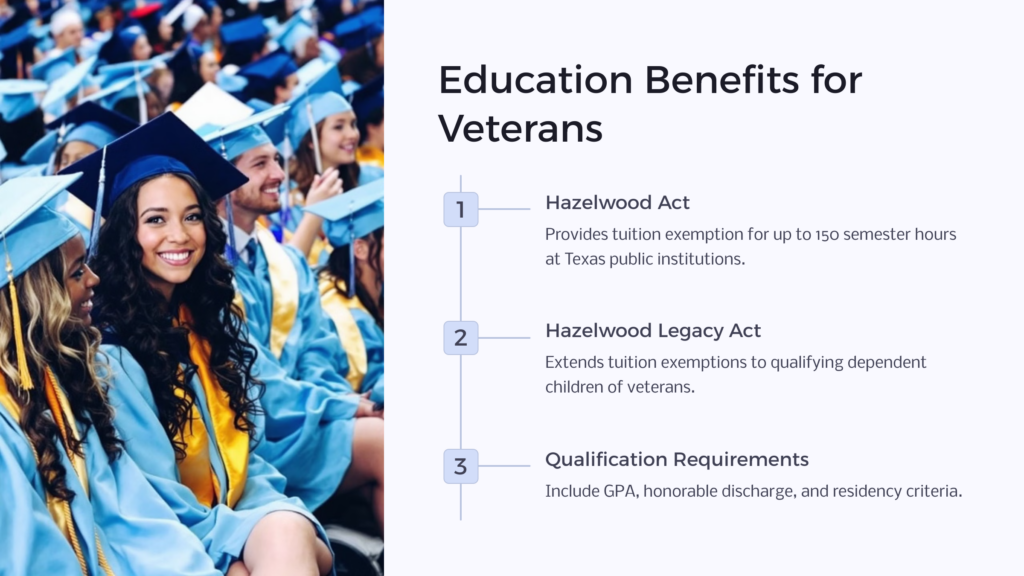
There are some VA educational benefits available to students. The Hazelwood Act is one of Texas veterans’ most well-known education programs. It provides qualified veterans, their dependent children, and spouses with tuition exemption for up to 150 semester hours. The Hazelwood Act exempts most fees charged by Texas public institutions of higher education. The Hazelwood Act does not cover books, living expenses, or supply fees.
There are a variety of qualification requirements for the Hazelwood Act in Texas, including GPA requirements, honorable discharge requirements, and others.
Like the Hazelwood Act, the Hazelwood Legacy Act offers tuition exemptions for qualifying dependent children of veterans in Texas. To take advantage of this program, the veteran must reside in Texas when the dependent uses the Hazelwood Legacy Act benefit. Tuition exemption can only be used by one dependent at a time through this program.
Financial Benefits
Veterans in Texas are not required to pay income tax (since no individual in Texas has to pay income tax). Property tax breaks are also available to qualifying disabled veterans and their spouses through the State of Texas. Since tax exemption laws can change rapidly, it’s important to talk to a local tax professional to find out what exemptions and regulations apply to Veterans in the current or previous tax years.
Healthcare Benefits
There are several healthcare benefits only available to veterans. Veterans who live in Texas can use an online VA resource locator to find VA healthcare programs throughout the state. Available programs can assist veterans with both their physical and mental health needs.
Employment Benefits
The Texas Department of Licensing and Regulation allows qualified veterans to receive credit for licensing and other credentials required to operate or work for a business in Texas. The requirements for OJT, time-in-service, and other military experience can significantly vary based on the type of license required or job.
Other programs that offer employment benefits to veterans include:
- Work in Texas Veteran Jobs: This program helps veterans learn how their military skills can make them good candidates for various civilian marketplace jobs. It also helps veterans find jobs that require the same skills they have already gained through their military service.
- Hire Veterans: This is one of the most trusted online veteran jobs marketplaces and helps veterans find good jobs. Veterans can create a free profile and access thousands of jobs that are targeted at veterans.
- Texas Veterans Commission: This organization helps veterans find the right career by providing job coaching, resume development, interview skills, and other valuable services. Veterans can also access on-the-job training programs through the TVC. These programs are highly appealing to veterans who want to learn a new skill or trade without attending formal higher education classes.
- Texas Workforce Commission: Through this organization, qualified veterans can receive unemployment benefits. If the applicant was discharged honorably, completed a full term of service, and is physically living in Texas, he or she has a good chance of being approved for an unemployment claim in Texas.
Military spouses may also be eligible for veteran unemployment benefits if they relocated due to PCS orders. Other factors may also lead to military spouses being able to claim unemployment benefits even if they relocate. The Texas Workforce Commission can provide additional details on the qualification requirements for relocated military spouses applying for unemployment benefits.
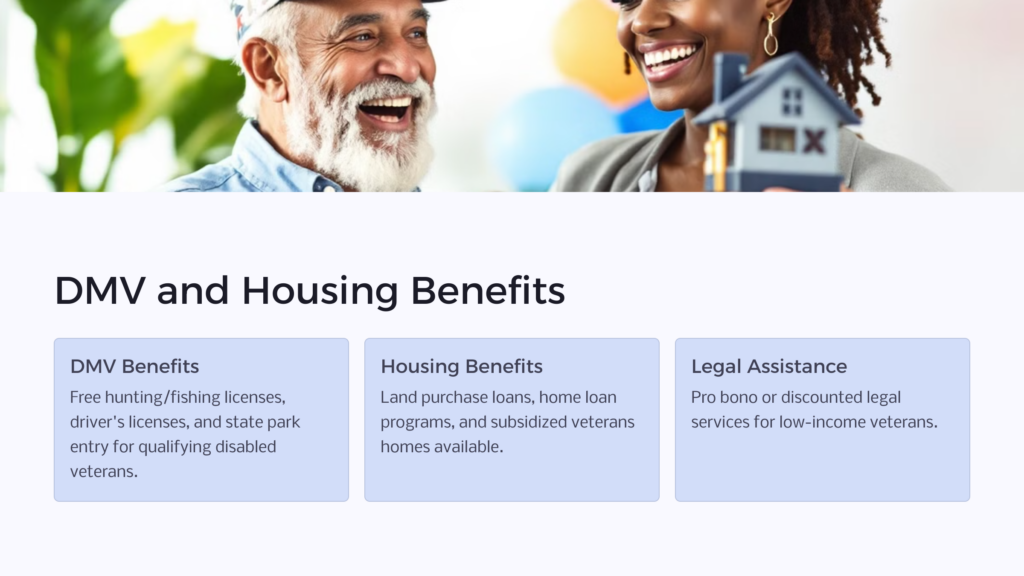
DMV Benefits
Disabled veterans living in Texas may be eligible for various DMV benefits. Here are some possibilities.
- Free Hunting and Fishing Licenses: Disabled veterans with a VA disability rating of 50% or higher and have been honorably discharged may receive a free hunting and fishing license each year from Texas Parks and Wildlife. The Super Combo Hunting and All-Water Fishing Package includes upland game bird endorsement, resident hunting license, resident fishing license, freshwater and saltwater fishing endorsement, archery endorsement, and upland game bird endorsement. Duck licenses are provided separately and are not part of the Super Combo Hunting and All-Water Fishing Package.
- Free Driver’s License: A free Texas driver’s license or ID card is available to disabled Texas veterans with a VA disability rating of at least 60% and an honorable discharge.
- Free Entry to Texas State Parks: If you are a disabled Texas veteran with a service-connected disability rating of at least 60% or the loss of a lower extremity, you can receive a Disabled Veterans passport (which gives you free entry to state parks in Texas). You can bring one person with you to assist you in the park and receive 50% off the standard entry fee for that person.
In addition to the above benefits, honorably discharged veterans who apply for a Texas handgun license after at least 365 days following military service may obtain a handgun license for a discounted rate.
Housing Benefits
Qualified veterans can borrow money from the state of Texas to purchase land. The Veterans Land Board offers up to $150,000 per transaction so that veterans can purchase land that has competitive interest rates. Other home loan options available to veterans include:
- TDHC My Choice Texas Home Loan
- My First Texas Home Loan through the Texas Department of Housing and Community Affairs
- TSAHC Sweet Texas Home Loan
- Homes for Texas Heroes Home Loan Program through the Texas State Affordable Housing Corporation
- Texas State Veterans Homes
The Texas State Veterans Homes program subsidizes a portion of a veteran’s cost to live in a Texas State Veterans Home. Each of these homes provides long-term care for veterans and their spouses. The homes are located in the following cities:
- Tyler
- McAllen
- Bonham
- Big Spring
- Temple
- Amarillo
- El Paso
- Floresville
Residents can choose between semi-private and spacious private rooms (based on availability). There are also memory care units that provide specialized care at each home.
For veterans who don’t want to live in assisted living communities but want help purchasing a home with little to no down payment, the Veterans Housing Assistance Program can be very helpful. This program allows veterans and their spouses to receive a fixed-rate loan for up to $424,100 with competitive terms. To qualify for a discounted interest rate, veterans must have a service-connected disability rating of at least 30%.
Miscellaneous Benefits
Other benefits available to veterans include specialty license plates and legal assistance through one of the following organizations:
- Texas Lawyers for Texas Veterans
- Texas Veterans Legal Assistance Project
The State Bar of Texas provides the first program, while the Texas Legal Services Center provides the latter. Both programs provide pro bono or discounted legal services to Texas veterans and their families who meet low-income eligibility requirements.
What Qualifies You as a Veteran in Texas?
According to Title 38 of the Code of Federal Regulations, a veteran “served in the active military, naval, or air service and was discharged or released under conditions other than dishonorable.” There is no minimum time required in service to be considered a veteran, but you must have served on active duty at some point. Active duty is simply full-time service. With the exclusion of a pass or leave, active-duty service members are available at all times.
But when it comes to eligibility for veterans’ benefits, other considerations can impact whether or not a veteran is accepted for a particular program or benefit. The U.S. Department of Veterans Affairs specifies that any veteran may be eligible for VA healthcare benefits if they:
- Entered active duty after October 16, 1981, or enlisted after September 7, 1980
- Have served 24 months continuously or the full period they were called to serve.
However, there are some exceptions to the above requirements, including serving before September 7, 1980, being discharged for a disability caused by active-duty service, or being discharged for a hardship.
Is Texas Tax-Free for Veterans?
As mentioned earlier in this guide, the state of Texas doesn’t collect income tax on individuals (which means that Texas veterans on active duty don’t have to pay state income taxes). Since the state doesn’t collect individual income taxes, there is no reason for veterans or other individuals to file state income taxes each year. Unfortunately, veterans in Texas and throughout the nation are still required to pay federal income taxes and file federal income tax returns every year.
However, some military pay may be federally tax-exempt. For example, enlisted military members serving in combat zones may qualify for a federal tax exemption. Some stipulations soldiers should be aware of include being assigned to an IRS-approved combat zone while receiving “special pay” for very specific and imminently dangerous situations. The IRS publishes approved combat zone information on its website. Reviewing this information can help determine whether some of your military pay qualifies for federal tax exemption.
Franchise Tax Exemption
Veterans who want to form an LLC should be happy to learn that Texas reinstated the franchise tax exemption for veterans in 2022. This tax exemption can help veterans save money when they open a franchise or form a corporation.
To qualify for the Texas franchise tax exemption, the following requirements must be met:
- The business must be 100% owned by one or more honorably discharged veterans with proof of veteran status in a branch of the United States Armed Services.
- The business must have been organized or formed in Texas sometime between January 1, 2016 and January 1, 2020, or between January 1, 2022 and January 1, 2026.
- The business must reach out to the Texas Veterans Commission for a Letter of Verification of Veteran’s Honorable Discharge. This letter must be requested from each owner of the business.
All of the above requirements must be met for the business to be considered a “new veteran-owned business” that qualifies for the Veterans Franchise Tax Exemption.
By waiving the franchise fee for veterans who form small businesses, the government allows qualified veterans to receive substantial tax savings. This is especially true if the business experiences a high level of success. In addition to the tax exemption, the Texas Veterans Commission also provides counseling, financing advice, training, and resources fo
veterans who want to start a new business.
Do Veterans Pay Property Tax in Texas?
Some veterans may qualify for exemption from property taxes on their primary residences. Texas veterans must have one of the following ratings to qualify for this benefit:
- 100% Permanent and Total VA disability rating
- 100% Individual Unemployability VA rating
- 100% Scheduler VA rating
If the veteran in question qualifies for property tax exemption under one of the above categories, the tax exemption also extends to the veteran’s surviving spouse. The surviving spouse must remain in the home and remain unmarried to qualify for the exemption.
Veterans who have a 10% to 90% VA disability rating connected to their service can get a property tax reduction. Each veteran’s reduction amount depends on the associated disability rating percentage.
What Is the Texas Veterans Commission?
The Texas Veterans Commission is an organization that has supported and advocated for Texas veterans and their families since 1972. The organization helps veterans in several ways, including:
- Assisting veterans with the disability application process
- Representing veterans at appeals
- Helping each survivor and family member explore available benefits
- Partnering with veteran organizations such as Texas Workforce Commission to provide veterans with resume help, interview practice, and job searches
- Working with communities, mental health providers, faith-based organizations, and other agencies to improve veteran access to mental health services.
- Assisting in the veterans’ re-entry and treatment courts for justice-involved veterans
- Working with employers to determine applicant military skillsets, organize veteran hiring events, and otherwise increase veteran hiring
- Ensuring universities and schools are eligible for applicable VA educational benefits while providing training and education opportunities to veterans and their families.
- Assisting with the administration of the Hazelwood Act (which provides veterans with tuition-free education for 150 semester hours at a Texas university or college)
- Resolving VA medical care issues (including problems with treatment, medications, or appointments)
- Awarding monetary grants to local government agencies and nonprofits that provide all types of assistance to veterans and their families
- Connecting women veterans with each other and informing them of benefits available to them through the Women Veterans Program
- Guiding veterans and families through the process of successfully owning and operating a business
The Texas Veterans Commission works hard to ensure that all veterans can maintain the highest quality of life. The organization coordinates many different departments and programs on a federal, state, and local level to achieve its goal. There are a wide variety of VA benefits out there, and the Texas Veterans Commission wants all veterans and their family members to be aware of those benefits.
What Is the Texas Veteran Land Loan Program?
The Texas Veteran Land Loan Program allows Texas veterans to borrow as much as $150,000 to purchase land. There is no other program like it in the nation. Veterans can use the money to purchase land at competitive interest rates. Usually, veterans who qualify for this program must put a down payment of 5% (at a minimum) for tracts of one or more acres.
This loan program is very user-friendly and provides Texas veterans and their families with an exclusive form of financing that can help them purchase land. The bonds that fund the program come from loan repayments. The administration costs of the program are financed through a small fee attached to each loan.
To be eligible for this program, veterans and military members must be 18 years of age or older, legal residents of Texas, and meet one of the following requirements:
- A member of the Texas National Guard
- An active duty military member
- A veteran who has served no fewer than 90 active duty days (unless discharged honorably)
- A reserve component military member who has finished 20 qualifying years for retirement
- A surviving spouse of a veteran with a service-connected death or who is listed as missing in action
The land in question must contain at least one acre and be wholly located within the state of Texas to qualify for the Texas Veteran Land Loan Program. It must also have usable and legal access to a public road and cannot be zoned for commercial use only.
How Can I Receive the Benefits I’m Eligible for in Texas?
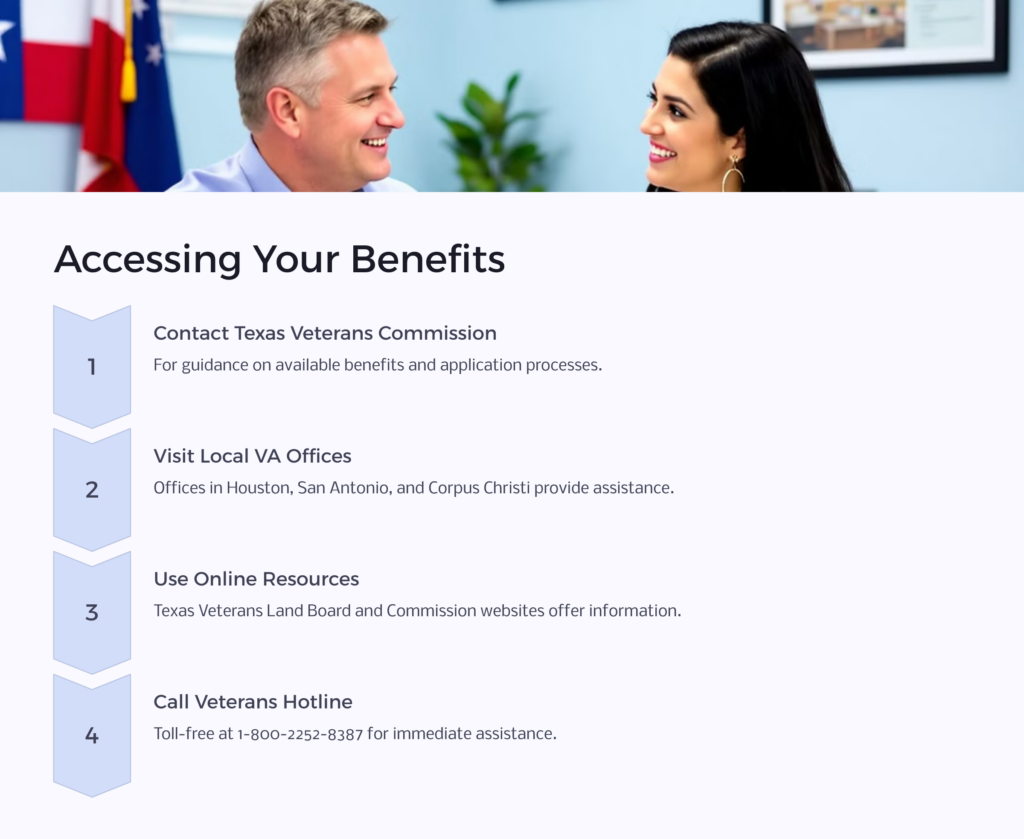
If you’re unsure of the benefits you’re eligible for in Texas, try contacting the Texas Veterans Commission or one of the U.S. Department of Veterans Affairs offices located in Houston, San Antonio, or Corpus Christi. Some information is also available via the county offices or the county clerk office. Ask for a local veterans benefits guide so you can take the necessary steps to request services that will enrich your life.
State benefits available to veterans include:
- Special license plates
- State veterans cemeteries
- Home improvement
- Land programs
- Tuition and education benefit
- State veterans homes
- Tax exemption for veterans
- Housing assistance
- Vocational employment and training programs
- Employment and reemployment assistance
- Free recording of discharges
For more information about veterans benefits in Texas, visit your local veteran services office. You can also access the Texas Veterans Land Board (https://vlb.texas.gov/.) or the Texas Veterans Commission website (http://www.tvc.state.tx.us). If you’d rather speak to someone over the phone, you can call the Texas Veterans Hot Line toll-free at 1-800-2252-8387.
 Benefits.com Advisors
Benefits.com Advisors
With expertise spanning local, state, and federal benefit programs, our team is dedicated to guiding individuals towards the perfect program tailored to their unique circumstances.
Rise to the top with Peak Benefits!
Join our Peak Benefits Newsletter for the latest news, resources, and offers on all things government benefits.















